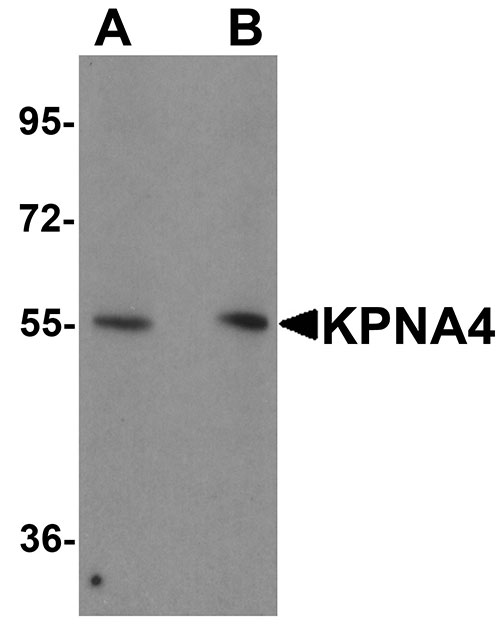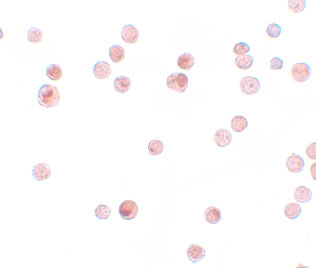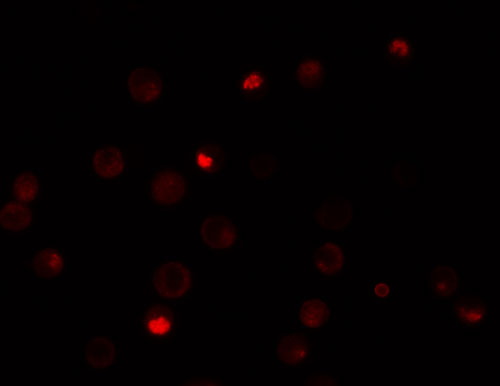KPNA4 Antibody
- 产品详情
- 实验流程
- 背景知识
Application
| WB, IF, ICC, E |
|---|---|
| Primary Accession | O00629 |
| Other Accession | EAW78632, 119599038 |
| Reactivity | Human, Mouse, Rat |
| Host | Rabbit |
| Clonality | Polyclonal |
| Isotype | IgG |
| Calculated MW | 57887 Da |
| Concentration (mg/ml) | 1 mg/mL |
| Conjugate | Unconjugated |
| Application Notes | KPNA4 antibody can be used for detection of KPNA4 by Western blot at 1 µg/mL. Antibody can also be used for immunocytochemistry starting at 2.5 µg/mL. For immunofluorescence start at 20 µg/mL. |
| Gene ID | 3840 |
|---|---|
| Other Names | Importin subunit alpha-3, Importin alpha Q1, Qip1, Karyopherin subunit alpha-4, KPNA4, QIP1 |
| Target/Specificity | KPNA4; |
| Reconstitution & Storage | KPNA4 antibody can be stored at 4℃ for three months and -20℃, stable for up to one year. As with all antibodies care should be taken to avoid repeated freeze thaw cycles. Antibodies should not be exposed to prolonged high temperatures. |
| Precautions | KPNA4 Antibody is for research use only and not for use in diagnostic or therapeutic procedures. |
| Name | KPNA4 {ECO:0000303|PubMed:38512451, ECO:0000312|HGNC:HGNC:6397} |
|---|---|
| Function | Functions in nuclear protein import as an adapter protein for nuclear receptor KPNB1 (PubMed:10567565, PubMed:20818336, PubMed:28760339, PubMed:29042532, PubMed:38512451). Binds specifically and directly to substrates containing either a simple or bipartite NLS motif (PubMed:20818336, PubMed:28760339, PubMed:29042532, PubMed:38512451). Docking of the importin/substrate complex to the nuclear pore complex (NPC) is mediated by KPNB1 through binding to nucleoporin FxFG repeats and the complex is subsequently translocated through the pore by an energy requiring, Ran-dependent mechanism (PubMed:20818336, PubMed:28760339, PubMed:29042532, PubMed:38512451). At the nucleoplasmic side of the NPC, Ran binds to importin-beta and the three components separate and importin-alpha and -beta are re- exported from the nucleus to the cytoplasm where GTP hydrolysis releases Ran from importin (PubMed:20818336, PubMed:28760339, PubMed:29042532, PubMed:38512451). The directionality of nuclear import is thought to be conferred by an asymmetric distribution of the GTP- and GDP-bound forms of Ran between the cytoplasm and nucleus (PubMed:20818336, PubMed:28760339, PubMed:29042532, PubMed:38512451). Mediates nuclear import of AARS1, MRTFA and RANBP3 (PubMed:10567565, PubMed:20818336, PubMed:28760339, PubMed:38512451). |
| Cellular Location | Cytoplasm. Nucleus |
| Tissue Location | Highly expressed in testis, ovary, small intestine, heart, skeletal muscle, lung and pancreas, but barely detectable in kidney, thymus, colon and peripheral blood leukocytes |
For Research Use Only. Not For Use In Diagnostic Procedures.
Provided below are standard protocols that you may find useful for product applications.
BACKGROUND
KPNA4 Antibody: Karyopherin, a cytosolic and heterodimeric protein complex consisting of alpha and beta subunits, is responsible for targeting proteins with nuclear localization signals to the nuclear pore complex by an energy requiring, Ran-dependent mechanism. The alpha subunit and imported substrate enter the nucleus and accumulate in the nucleoplasm, while the beta subunit accumulates at the NPC. Molecules containing the classical nuclear localization signal (NLS) are transported into the nucleus by alpha/beta heterodimers. KPNA3 has been shown to be important in the TNF-α-induced nuclear import of NF-κB. It is also involved in the stress-mediated nuclear stabilization of p53 and the nuclear import and replication of HIV-1 in both dividing and non-dividing cells.
REFERENCES
Moroianu J. Molecular mechanisms of nuclear protein transport. Crit. Rev. Eukaryot. Gene Expr.1997; 7:61-72.
Gilchrist D and Rexach M. Molecular basis for the rapid dissociation of nuclear localization signals from karyopherin alpha in the nucleoplasm. J. Biol. Chem.2003; 278: 51937-49.
Goldfarb DS, Corbett AH, Mason DA, et al. Importin alpha: a multi-purpose nuclear-transport receptor. Trends Cell Biol.2004; 14:505-14.
Fagerlund R, Melen K, Cao X, et al. NF-kappaB p52, RelB, and c-Rel are transported into the nucleus via a subset of importin alpha molecules. Cell Signal.2008; 20:1442-51.
终于等到您。ABCEPTA(百远生物)抗体产品。
点击下方“我要评价 ”按钮提交您的反馈信息,您的反馈和评价是我们最宝贵的财富之一,
我们将在1-3个工作日内处理您的反馈信息。
如有疑问,联系:0512-88856768 tech-china@abcepta.com.























 癌症的基本特征包括细胞增殖、血管生成、迁移、凋亡逃避机制和细胞永生等。找到癌症发生过程中这些通路的关键标记物和对应的抗体用于检测至关重要。
癌症的基本特征包括细胞增殖、血管生成、迁移、凋亡逃避机制和细胞永生等。找到癌症发生过程中这些通路的关键标记物和对应的抗体用于检测至关重要。 为您推荐一个泛素化位点预测神器——泛素化分析工具,可以为您的蛋白的泛素化位点作出预测和评分。
为您推荐一个泛素化位点预测神器——泛素化分析工具,可以为您的蛋白的泛素化位点作出预测和评分。 细胞自噬受体图形绘图工具为你的蛋白的细胞受体结合位点作出预测和评分,识别结合到自噬通路中的蛋白是非常重要的,便于让我们理解自噬在正常生理、病理过程中的作用,如发育、细胞分化、神经退化性疾病、压力条件下、感染和癌症。
细胞自噬受体图形绘图工具为你的蛋白的细胞受体结合位点作出预测和评分,识别结合到自噬通路中的蛋白是非常重要的,便于让我们理解自噬在正常生理、病理过程中的作用,如发育、细胞分化、神经退化性疾病、压力条件下、感染和癌症。








